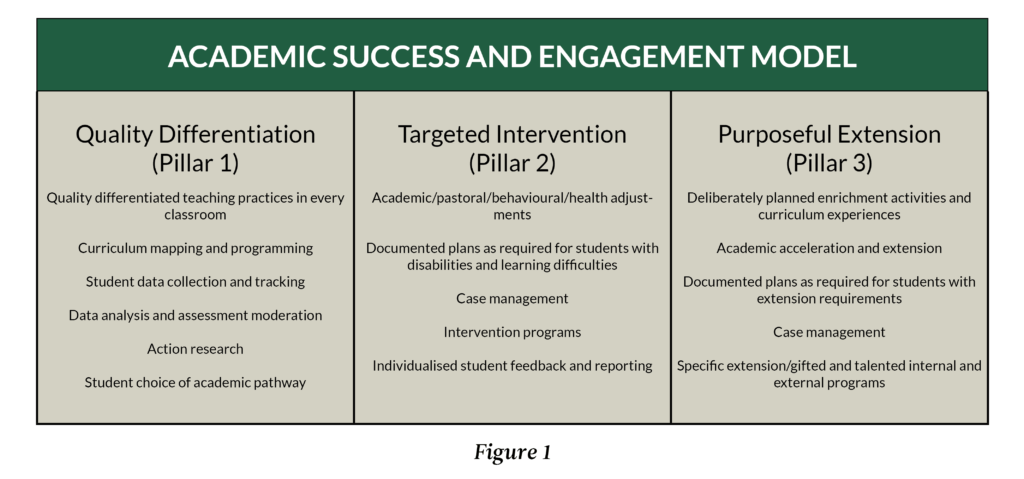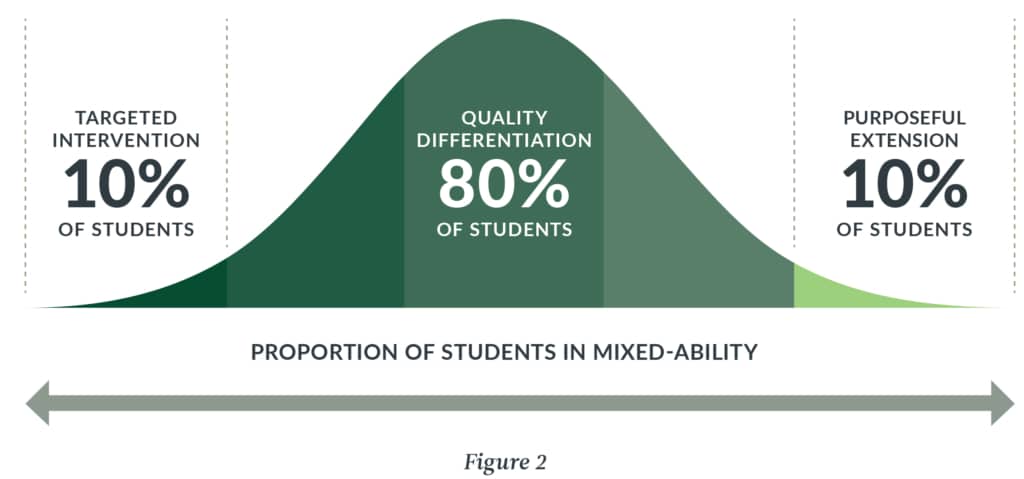At Wesley, we open doors to students rather than close them. We celebrate individuality and take the time to get to know our students. We recognise that each child has unique talents, abilities and learning needs and, therefore, the College strives to implement a rich and varied curriculum that provides equal opportunity and academic rigour.
Central to our ethos is a strengths-based approach. We firmly believe that with the right conditions, every child can learn and experience academic success against their own personal goals. We recognise that individual academic success and student engagement are interrelated, and that both are enhanced through meaningful teacher-student relationships.
Vehicles to success
To promote individual academic success and maximise engagement, each student at Wesley is empowered to make their own academic choices and direct their own academic pathway. Every teacher supports individual student choice through deliberate quality differentiation practices, continuous reporting practices, enriching learning and teaching programs, academic coaching and academic data tracking.
In addition to this, teachers ensure the learning needs of those at educational risk or with a disability are addressed through targeted intervention.
At Wesley, our Academic Success and Engagement Model is strategically overseen by the Director of Strategy in collaboration with the College Executive. The Dean of Intervention and Extension leads a dedicated team and is responsible for targeted intervention and purposeful extension. They work in consultation with the Head of Junior School, Head of Middle School, Dean of Students (Senior School) and specialist teachers. The Dean of Research and Pedagogy leads quality differentiation and pedagogy practice across the College and is responsible for collaborating with stakeholders and upskilling teachers.
So, what is Wesley College’s Academic Success and Engagement Model?

Pillar 1: Quality Differentiation – not just another edu-speak word
Differentiation is a teacher acknowledging and addressing the diverse learning needs of their students.
Quality differentiated teaching practices ensure students in ‘the middle’ (generally up to 80% of a cohort) are adequately challenged, supported and enriched. (See Figure 2.)

Differentiation is about setting appropriately high expectations for each student and ensuring that their learning is systematically planned and responsively implemented, to facilitate their progress. This means knowing each student, regularly checking on their knowledge and understanding, and enacting teaching practices that are well-planned, adaptive and based on the best available evidence.
Pillar 2: Targeted Intervention
The College recognises that some students require adjustments to the teaching and learning program to access and participate in a curriculum that meets their needs. This may include targeted academic, pastoral, health or behavioural intervention programs, which aim to help students reach a defined standard.
Targeted intervention programs across the College are driven by student data and are led by the Dean of Intervention and Extension in consultation with the Head of Junior School, Head of Middle School, Dean of Students (Senior School), Academic Intervention teachers, College Psychologists and the Health Centre. Each sub-school has unique collaborative service models, which aim to meet the diverse needs of learners.
This may include:
- Individual academic support.
- In-class flexible groupings in specific learning blocks or specific subjects.
- Curriculum and assessment modification and review.
- Curriculum initiatives.
- Academic mentoring and coaching.
- Documented plans.
Students have a significant role to play in the development and review of their documented plan as they increasingly become advocates for their own learning over time.
Pillar 3: Purposeful Extension
The College recognises that some students require further extension to their educational experience. Central to this is deliberately planned enrichment activities and curriculum programs. Enrichment refers to the broadening of learning opportunities and experiences that encourage students beyond the regular curriculum.
Additionally, students who are identified as gifted and talented may also require adjustments to the learning and teaching program. This may include targeted acceleration or extension initiatives. Acceleration occurs when students move through the traditional curriculum at rates more quickly than expected. Extension refers to the deepening of understanding in specific subject areas that encourages students to go further.
To meet the needs of our gifted and talented students the College may employ the following acceleration or extension initiatives:
- Pre-testing and post-testing.
- Streaming classes in Years 6-9.
- Flexible/ability student groupings from Pre-kindergarten to Year 6.
- A range of voluntary co-curricular pursuits.
- A variety of further opportunities within and outside the curriculum.
- Year level or subject acceleration.
- External and internal gifted and talented academic competitions at local, national and international levels.
Conclusion
Wesley’s inclusive philosophy is one of our great strengths. Underpinned by our meaningful Academic Success and Engagement Model, the College firmly believes that with the right practices, programs, support and quality relationships between students and teachers, every child can learn and experience success and be empowered to lead a purposeful life.
Written by Mathew Irving (Director of Strategy) and Tracey Coad (Dean of Intervention and Extension).
Subscribe to Wesley College News & Events